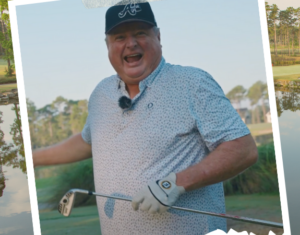State of the Game: The Experts’ Take – Growing the Game for the Masses
Our all-star panel – Golf Channel/Sirius XM’s Michael Breed, renowned swing guru Hank Haney, Golfweek’s Geoff Shackelford, Golf Channel/PlayGolfMyrtleBeach.com’s Charlie Rymer, pro golfer/social media personality Paige Spiranac and Golf Tourism Solutions’ Bill Golden – goes in-depth on the first of many topics surrounding the welfare of the game. This discussion raises the question of who bears the ultimate responsibility of growing the game for the masses.
Geoff Shackelford: We’ve never had better maintenance, better equipment in the game, and it’s flat. So we’re always told, while we can’t take a little distance here or we can’t do this or that because it’ll not grow the game, well, the game has had this chance with this amazing … We’ve got better service. We’ve got better clubs. We’ve got better …
Paige Spiranac: Everyone’s missing the entire point though.
Geoff Shackelford: … maintenance and it’s flat, so why is that?
Paige Spiranac: We always talk about growing the game, growing the game. Yeah, we’re talking about rules changes or things that don’t really matter to people who are not involved in the game. They want to have a relaxed dress code. They want to have music on the golf course. They want to feel welcomed. They don’t care how fast the green is rolling. They just want to go out and have a good time with their buddies, and so we spend so much time, like this whole discussion, it’s interesting to us because we are so heavily involved within golf, but think about someone else who has never played before. Right over their heads, they don’t care and they don’t feel welcomed, they don’t understand it, and now it’s like, with the rules changes and the ball and everything, let’s just make something that’s already difficult and hard to understand even more difficult and harder to explain to them.
It doesn’t make sense and it’s not easy. We need to really strip it back and talk about what the amateur golfers want. Let’s talk about that. What do they need and what do they want, because they’re the people who are going to be coming into the game, and that’s how we really truly grow the game, and people who always say, “Let’s grow the game,” they don’t want to grow the game. They just want to keep the game exactly how it is for themselves. And so it’s frustrating to try to make all these changes for the better, but they’re always resisting it.
So, we spend all this time talking about things that don’t actually matter to grow the game.
Geoff Shackelford: Yeah.
Bill Golden: Paige brings up the amateur golfers and the livelihoods of so many of us in the golf business are relying upon amateur golfers. The average golfer, the folks that are coming here to Myrtle Beach and playing golf in their hometown. In this group we can’t really agree on much, and probably we could say that maybe about the national associations. But it brings to mind, who is in charge of golf at the grassroots level? Who is paying attention or asking those questions you’re asking? Or the distance debate as it relates to amateurs or the rules as it relates to participation? Who’s keeping track of that? Who’s in charge of that?
Paige Spiranac: That’s the problem – the people at the top want to keep it the way it is and they don’t want to make changes. And so I think that’s why people are so resistant to make the change and so they say “Let’s grow the game” because it sounds great. And it seems like they’re making progress but they’re not actually doing anything to make changes. I see it mostly because my focus is on social media. There are people who maybe like golf but they’re not obsessed with golf. A lot of people who follow me are not golfers per se, and they are livid over the rules. They don’t understand them. They don’t understand why golf is the way it is. And it seems that a lot of people seem to agree on the same things. So how is it not coming from the top and going down?
How are they not thinking of this stuff? We just covered so many things, you would think that these people who are running golf, the CEO’s, would be smart enough to figure this out. But something’s missing. So it’s either that they don’t understand it or they just don’t want change and I think that’s what it is.
Bill Golden: Are we asking the right question? Or who are we asking the questions of?
Charlie Rymer: Your question was (about) who’s in charge. And coming off what you said there, Paige, you’ve got to look at the mission statement of the organizing bodies. If you look at the USGA, their job is basically the rules of golf and conducting their championships. If you look at the PGA TOUR, that’s like slow play is a big debate, tour players are playing slow. Well the PGA TOUR’s mission isn’t to grow the game, it’s to provide playing opportunities for the players.
Michael Breed: Well, and entertainment too.
Charlie Rymer: Right, and entertainment. What people don’t realize, the PGA TOUR is such a good product because it hits its time windows on Saturday and Sunday. They’ve got all this data with the current pace of play issues. They got all this data over time, how long it takes to play on this day with these weather conditions. They’re not in the business of bringing people to the game. You’ve got a PGA of America –
Paige Spiranac: Well, they shouldn’t say it though, that’s the problem is that they’re saying they’re trying to grow the game and this is what’s helping the game, and it’s not. So they need to be transparent about what they’re doing.
Charlie Rymer: Yep. So, if you look at mission statements, Augusta National has stepped up big, obviously running The Masters. But they’ve also embraced the responsibility of the game away from that golf tournament. I think Augusta’s doing wonderful things in golf if you look at bringing women –
Paige Spiranac: But look at the outside areas though of Augusta, are they really giving back and doing what they need to actually grow the game? When you really, honestly think about it, and you’re honest with yourself …
Michael Breed: Well let me ask you this question, what does growing the game mean to you?
Paige Spiranac: I think it’s getting people into the game who have never even thought about it, who are –
Michael Breed: So introduction into the game?
Paige Spiranac: Exactly.
Michael Breed: So if you look at all the studies, we are introducing more people to the game of golf than we’ve ever introduced to the game of golf before. We’re not keeping people in the game.
Paige Spiranac: Because they’re not welcomed. I think I see a different view because I am a 25-year-old woman. I mean, let’s just look around for a second. I think it’s hard to see the outside or what other people feel when you don’t deal with that every single day. So of course I don’t feel welcomed because of the fact that I’m a woman and I have to think about all these other things that you guys don’t even have to think twice about.
And so I have a different view on growing the game and feeling welcomed and inclusive. I don’t think golf is inclusive because of the way I’ve been treated. And so I have a different view and I think a lot of other people feel the same way that I do. If they don’t fit the mold of what people think the golfer is.
Bill Golden: Are people out there talking to amateur golfers to find out this information? Is there a national group? Everybody’s in silos – the (PGA) TOUR, the USGA …
Charlie Rymer: PGA …
Bill Golden: Everybody’s looking at … obviously there’s been consolidation over the years so equipment companies can react a certain way, golf ball companies, apparel companies. The number of golf courses we have, we have an over supply situation and that’s not necessarily anyone’s fault at the national level. But who’s looking at that game from a national standpoint? Asking amateur golfers, asking impressions about distance, rules, access … Is somebody paying attention to it at that level?
Hank Haney: I don’t think anybody (is). Maybe the PGA of America should. The USGA doesn’t. I mean they do their little surveys and try to get the survey to come out however they want it to come out –
Charlie Rymer: Echo chamber …
Hank Haney: Yeah, I mean, they get 30,000 people to respond out of 25 million golfers and think that’s a good response. I don’t think they ask people. They don’t come here to Myrtle Beach and see what real golfers are doing. They are at their country clubs in the Northeast or whatever.
Bill Golden: And wouldn’t they tell you that’s not their job? That their job is to be stewards of the …
Paige Spiranac: Because golf is honestly, it’s thriving. Golf is thriving and it’s doing well. The PGA TOUR is doing well. They have no reason to be concerned. But you have to look at the future and what’s going to happen and how things are changing. And if golf is really going to be as popular as when, say, Tiger (Woods) is not playing anymore. Who’s that young person? I feel like Tiger has driven it because he’s connected to so many other people outside of the golf demographic.
Charlie Rymer: It’s a big problem. There are a lot of people that they’re not going to watch golf unless Tiger’s playing, or unless Phil (Mickelson) is playing. Maybe a few others are in that category. But once you get outside of five or six players, there’s nobody out there that’s driving viewership.
Michael Breed: And don’t make the assumption, though, that driving viewership is growing the game of golf because the rounds of golf that are being played now are far less than they were before Tiger showed up. Certainly in the ‘95, ‘96 range there were many more rounds going on. There have been a lot of things that have affected the rounds of golf that are being played. I don’t necessarily think that we should look to the PGA TOUR to grow the game of golf. Maybe spread the game, get more people watching the game …



